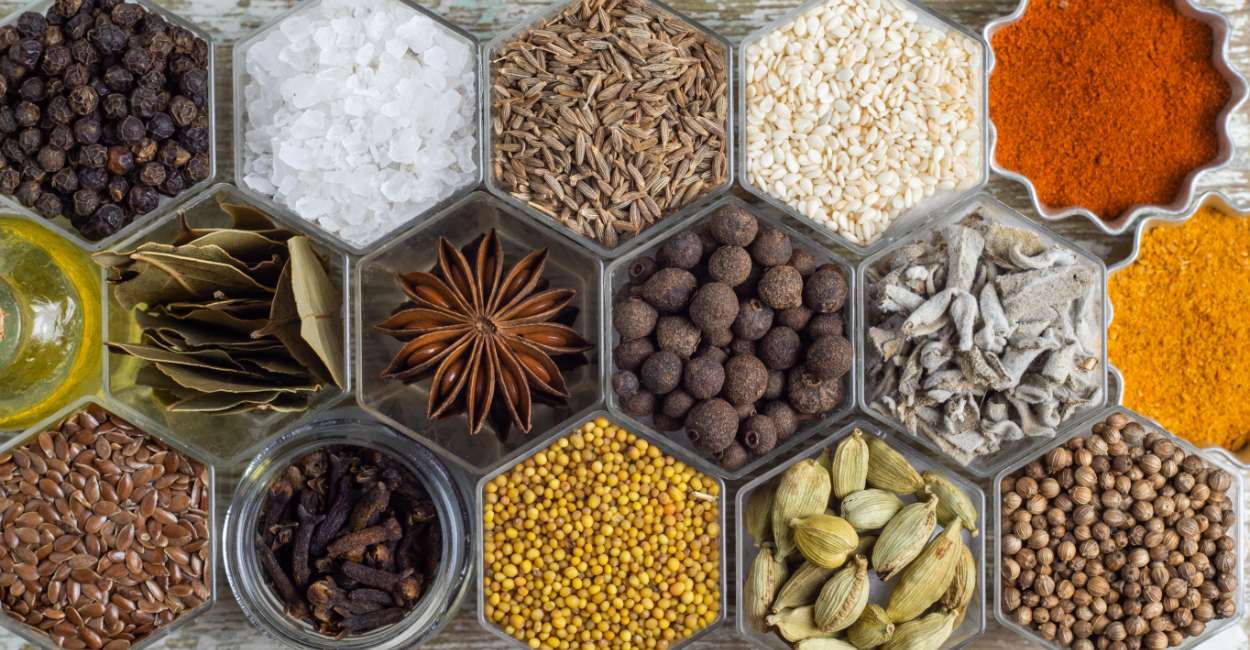
Spices play a crucial role in enhancing the flavors of our culinary creations, adding depth, complexity, and aroma to dishes. However, to fully enjoy the benefits of your spice collection, proper storage is essential.
This guide will walk you through the best practices for storing spices, ensuring they remain fresh, potent, and ready to elevate your culinary endeavors.
Choose the Right Containers:
- Opt for airtight containers to protect spices from moisture, which can lead to clumping and degradation.
- Use glass, metal, or high-quality plastic containers. Avoid storing spices in transparent containers as exposure to light can diminish their potency.
Avoid Heat and Sunlight:
- Store spices away from heat sources like stoves, ovens, and direct sunlight. Heat can cause the volatile oils in spices to evaporate, leading to flavor loss.
- Choose a cool, dark place for storage, such as a pantry or a cupboard.
Organize for Accessibility:
- Arrange your spices in a way that makes them easily accessible. Consider using a spice rack, drawer inserts, or a tiered shelf for efficient organization.
- Label each container with the spice name and purchase date to keep track of freshness.
Temperature Control:
- Maintain a consistent temperature in the storage area. Fluctuations in temperature can affect the flavor and aroma of spices.
- Aim for a cool, dry environment, ideally between 50°F to 70°F (10°C to 21°C).
Grinding and Whole Spice Storage:
- If possible, purchase whole spices and grind them as needed for the freshest flavor. Whole spices tend to retain their potency for a more extended period.
- Store whole spices in airtight containers, away from light and heat, just like ground spices.
Herb and Spice Blends:
- Homemade blends can be delightful, but they also require proper storage. Keep mixtures in airtight containers and store them in the same way as individual spices.
- Shake or stir blends occasionally to prevent settling.
Refrigeration Guidelines:
- Some spices, like paprika and ground red pepper, benefit from refrigeration to extend their shelf life. However, not all spices need refrigeration.
- Always check individual spice requirements before refrigerating, as moisture can be an issue in the fridge.
Quality Storage for Dried Herbs:
- Dried herbs, though different from spices, share similar storage requirements. Keep them in airtight containers away from light and moisture.
- Consider using dark glass jars to protect the herbs from light exposure.
Regular Inspection and Rotation:
- Periodically check your spice collection for freshness. Spices lose their potency over time, so it’s crucial to use them before they expire.
- Rotate your spices by moving older ones to the front and placing new purchases at the back.
Conclusion:
Proper spice storage is a simple yet vital aspect of maintaining a well-equipped kitchen. By following these guidelines, you can ensure that your spices remain at their peak freshness, ready to add a burst of flavor to your favorite dishes.
Invest a little time in organizing and storing your spice collection, and you’ll reap the rewards in the form of delicious, aromatic meals.
FAQs
1. Why is proper spice storage important?
- Proper storage ensures that spices retain their flavor, aroma, and potency, enhancing the overall quality of your culinary creations.
2. Can spices be stored in their original packaging?
- While the original packaging provides some protection, it’s best to transfer spices to airtight containers to shield them from moisture, light, and air.
3. Is it necessary to keep spices away from sunlight?
- Yes, exposure to sunlight can degrade the flavor and aroma of spices. Storing them in a cool, dark place helps maintain their quality.
4. Should I refrigerate all spices?
- No, not all spices require refrigeration. Some, like dried herbs, can benefit from it, while others may clump or lose flavor in a moist environment.
5. Can I store spices in the freezer?
- Freezing spices is generally not recommended, as the moisture can affect their quality. However, some exceptions exist, such as whole seeds or nuts.
6. How often should I check and rotate my spice collection?
- Regularly inspect your spices for freshness and potency. Rotate them by using older ones first and placing new purchases towards the back to ensure a constant supply of flavorful spices.
7. Can I store ground and whole spices together?
- While it’s possible, it’s generally better to store ground and whole spices separately. Whole spices tend to retain their freshness longer, and storing them together may impact their individual qualities.
8. Do spices have an expiration date?
- Spices don’t typically have a strict expiration date, but they can lose potency over time. Check for changes in color, aroma, and flavor to determine their freshness.
9. How do I prevent clumping in ground spices?
- To prevent clumping, store ground spices in airtight containers, and add a few grains of rice or a silica gel packet to absorb excess moisture.
10. Can I store spices in clear containers?
- It’s best to avoid clear containers as they expose spices to light, which can degrade their quality. Opt for dark, opaque, or UV-protected containers for better preservation.
11. Are there specific storage recommendations for spice blends?
- Spice blends should be stored in airtight containers, away from light and heat. Shake or stir the blends occasionally to prevent settling, and use them within a reasonable timeframe for optimal flavor.
12. What’s the best way to store fresh herbs?
- Fresh herbs can be stored in the refrigerator, wrapped in a damp paper towel and placed in a plastic bag. Alternatively, they can be frozen in ice cube trays with water or oil for longer storage.
Read More: Unveiling the Culinary Wonders: Why Spices Are Essential
